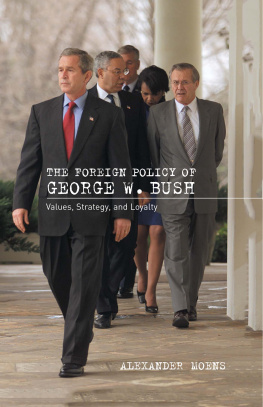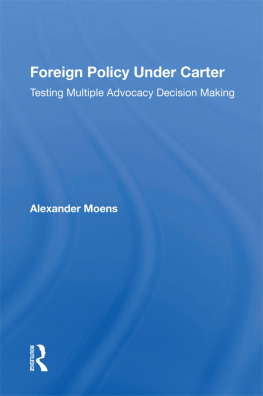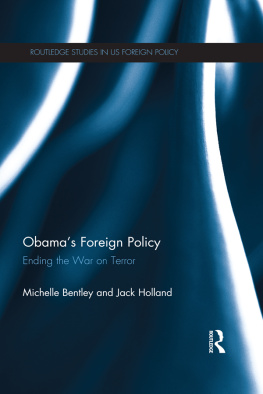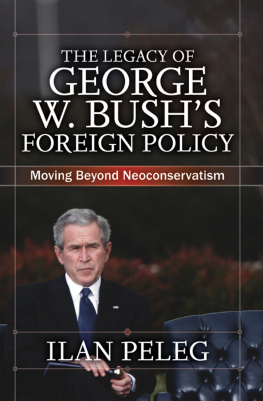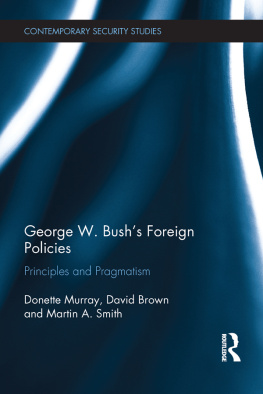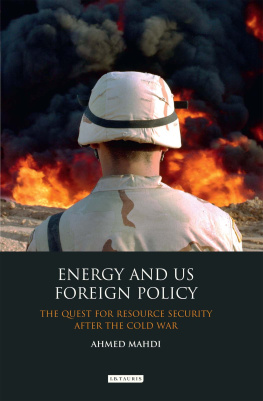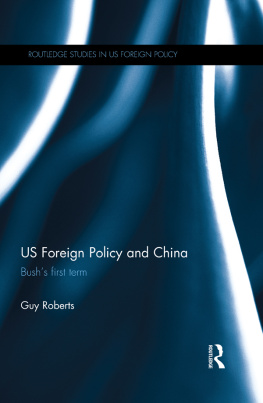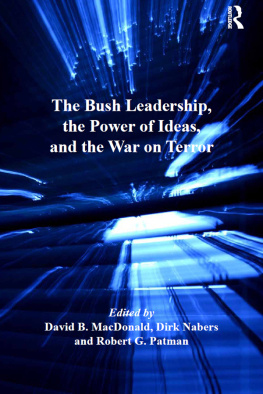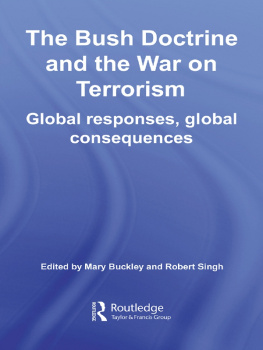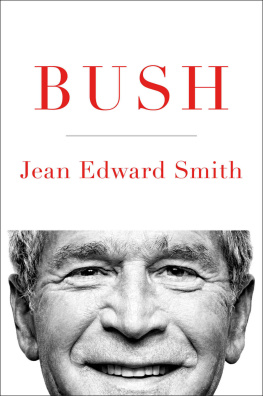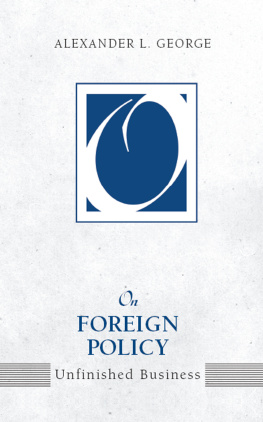THE FOREIGN POLICY OF GEORGE W. BUSH
In remembrance of:
Adriaan Moens, Professor, March 29, 1922-May 5, 2003
My father wrote at the end of his curriculum vitae the simple words that I wish to copy and follow: Soli Deo Gloria
First published 2004 by Ashgate Publishing
Published 2016 by Routledge
2 Park Square, Milton Park, Abingdon, Oxon OX14 4RN
711 Third Avenue, New York, NY 10017, USA
Routledge is an imprint of the Taylor & Francis Group, an informa business
Copyright 2004 Alexander Moens
Alexander Moens has asserted his right under the Copyright, Designs and Patents Act, 1988, to be identified as the author of this work.
All rights reserved. No part of this book may be reprinted or reproduced or utilised in any form or by any electronic, mechanical, or other means, now known or hereafter invented, including photocopying and recording, or in any information storage or retrieval system, without permission in writing from the publishers.
Notice:
Product or corporate names may be trademarks or registered trademarks, and are used only for identification and explanation without intent to infringe.
British Library Cataloguing in Publication Data
Moens, Alexander, 1959
The foreign policy of George W. Bush : values, strategy, and loyalty
1. Bush, George W. (George Walker), 1946- 2. Iraq War, 2003
3. United States - Foreign relations - 2001
I. Title
327.7309051
Library of Congress Cataloging-in-Publication Data
Moens, Alexander, 1959
The foreign policy of George W. Bush : values, strategy, and loyalty / by Alexander
Moens.
p. cm
Includes index.
ISBN 0-7546-4274-7
1. United States--Foreign relations--2001- 2. Bush, George W. (George Walker),
1946- I. Title.
E902.M625 2004
327.730090511--dc22
2004013268
ISBN 9780754642749 (hbk)
Contents
Brock Stephenson, a graduate student at Simon Fraser University, has been my research assistant throughout this entire project. His sharp eye and analytical mind has helped me find excellent sources and avoid numerous pitfalls.
The students in Political Science 449 in the Spring of 2004 read and critiqued all my chapters. Steven Molnar also read the entire manuscript and gave me many good tips.
John Bryson, at the Department of National Defence, Ottawa, and Carl Hodge, professor at Okanagan University College, read chapters and gave me their perceptive insights and critical comments.
Dean of Arts, John Pierce, gave me extra time to finish the book. The Social Sciences and Humanities Research Council of Canada and Simon Fraser University's Discovery Parks Grant provided financial help in the research.
Ben Fishman, a former student and now in the publishing business himself, did the final editing and formatting of the entire manuscript.
Most of all, thanks to my dear Marsha for her unfailing love and patience.
People had a difficult time understanding George W. Bush when they first heard of him in the 2000 election campaign. He spoke in simple terms (often haltingly) and exuded strong Texan and Christian values. It was easier to stereotype and belittle him than get a handle on his personality and background.
Never have so many negative books appeared so early about a president so little known. Some pictured Bush as lazy, inarticulate and as a lunkhead.
So was born the image in America and around the world of Bush as a spoiled son of a political dynasty, a representative of powerful lobbies, a candidate who lacked the necessary qualifications and a man who cannot think for himself. Bush was portrayed as a Texas bon vivant, uncommitted to any political purpose. He became the accidental candidate, who came ambling into history, as a result of political operators around him, such as Karl Rove.
After the terrorist attacks of September 2001, and especially after the war in Iraq, this river of literature became murkier yet, taking on a sinister quality. Revenge of his father's political fortunes turned into dynastic conspiracy theories. Fahrenheit 9/11 became the first explicit movie to slam Bush.
There were attempts by insiders such as David Frum and admirers like Bill Sammon to show Bush in a more favorite light.
What has been missing in all these accounts is a systematic attempt to explain Bush's person, his presidential style and decision-making process, and to link these to his presidency and foreign policy. The following chapters try to fill this gap by arguing that the person, character, and style of this president are the most important factors in understanding his presidency and foreign policy. To put it in plain words: the policy is the person.
Values, Strategy, and Loyalty
Three features describe this person, his presidential style and the substance of his foreign policy. First, Bush thinks and acts in terms of values; second, he has a natural talent for political campaign strategy, a skill he improved all his life. Finally, for this President all politics are personal and the glue is loyalty, trust and mutual responsibility between him and his advisers in the inner circle, key Congressional players, as well as foreign leaders.
In both domestic and foreign policy, Bush believes ardently in several key values and pursues them consistently. Abstract issues and public policy that are not grounded on these values cannot capture his interest. Compassionate conservatism is not a political ploy or campaign spin but contains the key principles he sought in Texas and pursues in the White House. The term includes values of personal responsibility and traditional family, faith-based communities helping the needy, and the quest to rebuild an American society and culture that respects faith and favors life. He is unwavering in these, but also unhurried. He knows from personal experience that simple, honest ideals are what matter most. Neither policy expertise nor intellectual insight can compete with that moral compass.
At the same time, Bush is a master strategist. He has always thought about politics from the vantage point of the race. He worked for years with two of the all-time best Republican strategists: Lee Atwater and Karl Rove. Bush is neither a simple idealist nor a pragmatist. His values are packaged inside a political strategy that is primed to invest and spend political capital with an acute sense of timing. Of course, values and political interests often clash, which explains the inherent tension in some of Bush's decisions.
Political loyalty is the third element of his presidential style. Loyalty to faith values, to family and to political teammates are all part of one continuum. This loyalty builds true relationships of trust from which flows a team effort and which makes people accountable to each other. Presidential advisors, Congressmen, and foreign leaders do not have much influence on Bush unless they become part of this loyalty circle.
This book starts with the argument in
As To earn that respect, he turned to the top themes of his campaign; tax cuts and education, applying strong leadership qualities and clear values. His tight White House organization and finely honed political game plan prevented him from becoming a lame-duck president on Day One.
makes the case that Bush's early foreign policy showed strong values, but unlike the domestic counterpart, lacked a game plan for action. Foreign policy could not compete with the domestic agenda, for in terms of concrete foreign and defense plans, only two made it on the priority list. Bush sought an amicable end to the Anti-Ballistic Missile Treaty in order to speed up plans for missile defense and launched a plan for military transformation. As he gained a reputation in domestic politics in mid 2001, the President remained without much political capital and vulnerable in foreign policy.

